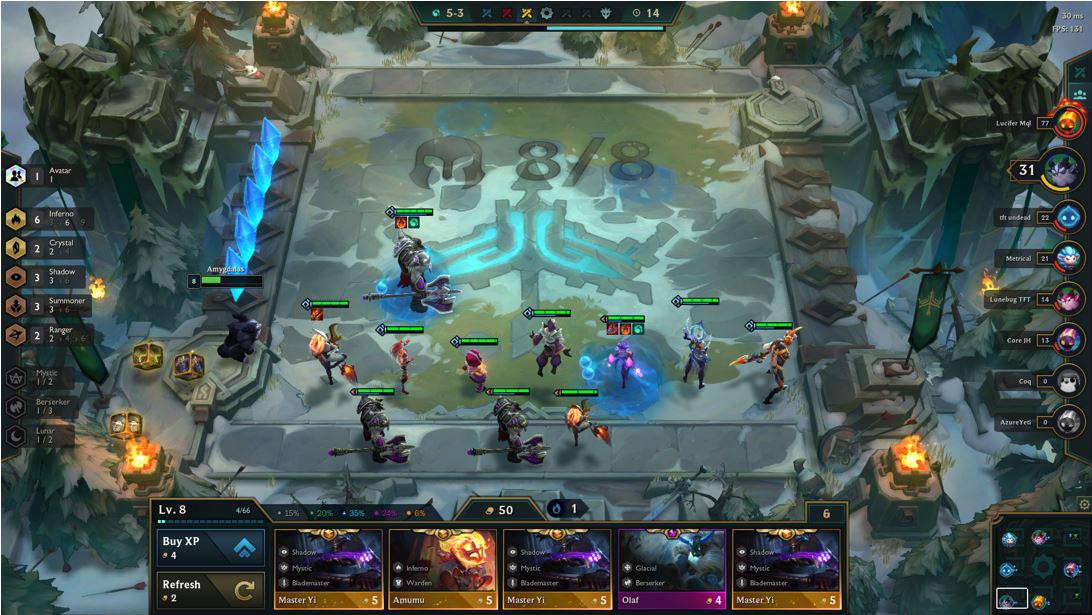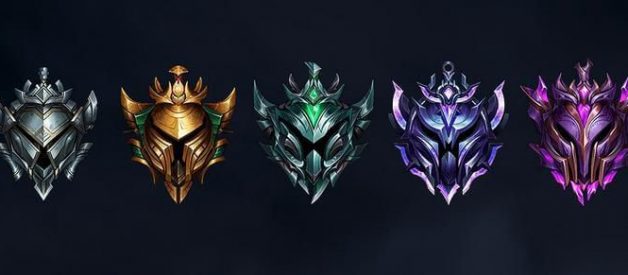What I learned on the climb to Diamond in Set 1, 2, and 3 of Teamfight Tactics!

Summary
- Fix the most common beginner mistakes (randomly rolling and holding units on the bench)
- Pick one comp and force it
- Understand the general leveling timeline
- Embrace variance
- Pick up more advanced skills (hotkeys, playing for first or fourth, suboptimal items, pivoting, positioning, and scouting)
- Places to stay up to date and learn more
Fix the most common beginner mistakes
When teaching friends new to the game I notice the same big mistakes that I made when I started.
Randomly rolling (aka donk rolling) is when a player rerolls gold away for no explicit purpose. They don?t have a pair they are trying to complete, they aren?t looking for a key unit to complete their comp, they are just rolling to see what happens.
The reason this is so bad is because it destroys your economy (the interest you get each round for every 10 gold you have). Econ in TFT compounds and is one of the keys to winning the game. If a player randomly rolls they will have less gold to spend over the course of the game and will fall behind the other players.
The other big mistake that is very common is holding a lot of extra units on the bench. Often this is going for unimportant three star champions, but can also be just holding units in the hope they will be completed or useful later. This is a big mistake for the same reason donk rolling is, it destroys economy. If a champion is not going to be used in the next round or two and it?s not in the target final comp, heavily bias towards selling it. Three star units are very rarely used at higher level play unless they are a key carry that will virtually win the game.
Pick one comp and force it
By far the best way to climb is to pick one team composition. This is for the same reasons that playing one S-tier deck in Hearthstone or playing one champion in League of Legends is optimal. A large amount of mind share is freed up to learn the other parts of a complex game.
Yes, playing one comp means that sometimes it will be highly contested in a game. Yes, playing one comp means that sometimes you will get unlucky and not roll any of your units even when they are not contested. But players as high as grandmaster force comps because it offers the benefits below.
- Items: You know which items to go for on carousel and can combine items early. If you have two tears and know you are building a comp that can use Seraph?s you can combine it right away. If you?re not sure what you?re doing you will likely just hold the items on the bench. You know backup items and who to give items to before they find their eventual home.
- Units: When you play one comp you learn which units you can flex in as well as which are best for each stage of the game. You also need a lot less brainpower to rolldown because you know what you?re looking for which helps your speed and accuracy. Additionally you hold a lot less gold on your bench because you know who?s in and who?s out.
- Leveling and econ: You know when your comp powerspikes. Do you need to roll at level seven to get that key four cost unit? Do you roll earlier because you just need to upgrade your three cost carry?
Note that I?m talking about end-game comps. In the early game you want to play whatever two-star champions and synergies you can find. Then you can pivot to your target comp units as you find them.
This is my favorite comp website though there are many floating around. I was partial to imperial knights in set one, ocean mages in set two, and cybernetics in set three, but any A-tier or higher comp will do.
Understand the general leveling timeline
Leveling is a key to success. Level too early and you will destroy your economy. Level too late and you?ll fall behind the rest of the lobby. To start out with learn standard leveling from one of the sources at the end of this article and stick with that. As you get better you can flex when you level based on the situation. For example at the end of set two standard leveling looks something like:
2?5: Level to 5 (do not roll at all before this)3?2: Level to 6 (roll down to ~10g if need to stabilize)4?1: Level to 7 (roll down)5?1: Level to 8Level to 9 dependent on game and comp
Embrace variance
Teamfight tactics is like Hearthstone or poker in that luck plays a large role, but the best players will always rise to the top in the long run. Embrace when you get shops like the below as well as when you lose (sometimes many games in a row) because of bad luck. Focus on what you could have done better instead of going on tilt.
 Source
Source
Pick up more advanced skills
Just the above will get you a long way! However as you start getting near Diamond you?ll have to start picking up some more advanced skills:
- Hotkeys: Learn to roll, level, and sell with hotkeys. It?s not a huge boost but once you do you?ll never go back
- Relative strength and playing for first or fourth: You start to get a sense for how strong you are versus the lobby overall. If you have no hope of winning don?t hoard gold trying to get to level eight. Stay at seven, roll all the way down, upgrade what you can, and try to finish as high as you can. Even finishing sixth instead of eighth helps a lot in the long run
- Suboptimal items: You won?t always get perfect items. You don?t want to just let all the items sit on the bench gathering dust. My rule of thumb is that if I ever had four or more components (or even three) I should absolutely make an item even if it wasn?t a perfect item for my end comp. Relatedly, once you get to stage five there won?t be any more item components so you might as well combine what you have!
- Pivoting: Even if you always play the same end-game comp as I recommend, it?s important to know how to get there. For example in set two playing Druids/Woodland or Electric in the early game is great no matter what comp you?re eventually building. Picking the right time to transition to your target comp just takes experience, but I typically wait until I have at least one or two upgraded units for the final comp.
- Positioning: Positioning is key at every stage of the game, but especially in the late game when units are mostly upgraded. Can you keep your carry away from assassins? Can you zephyr their key unit? Can you make sure their AOE misses your key unit?
- Scouting: I think scouting is overemphasized in most guides. It can take a lot of cognitive load. However, it certainly is helpful to know whether you are facing more magic or physical damage or whether you are racing someone else for a key unit. So as you climb higher it?s worth scouting at least before every round against monsters
- Increasing your odds using your bench: If you hold champions on your bench you increase the chances to get the champions you want. You absolutely should not do this if it costs you econ, but let?s say for example you have 44 gold at the end of a round. You can buy a four cost champion with the intention of selling it after the shop refreshes to give yourself a better chance for the four cost you want
Of course there are many more advanced tips as well! One that comes to mind is to use both the mouse and the keyboard to ?move? at the opening carousel so you can enter the circle the moment the barrier drops.
Places to stay up to date and learn more
The meta is constantly shifting and there?s always more to learn! The places I learn the most are the competitive TFT subreddit and watching streamers/YouTubers like Scarra, Hafu, and Kurumx.
Best of luck out there on the ladder! Happy climbing! Let me know if these tips work for you or if you have anything that would be good to add.
Thanks for giving this a read! If you liked it ? click the ? and give it a share.
I?m Dale Everett, I like thinking and writing about career development, self-improvement, gaming, and life in general.


